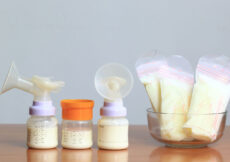Neonatal abstinence syndrome (NAS) is a withdrawal syndrome in babies who have had prenatal exposure to certain substances, such as opioids or alcohol, in the womb (1). Neonatal opioid withdrawal syndrome (NOWS) is a related term used to describe the withdrawal from opioids specifically (2).
Neonatal abstinence syndrome usually develops after the baby is born since they do not receive the drug from the mother anymore. As a result, the babies may go through certain withdrawal symptoms and discomfort during this period until the drug has completely passed out of their bodies.
This post will tell you more about neonatal abstinence syndrome’s causes, symptoms, diagnosis, treatment, and prevention strategies.
Causes Of Neonatal Abstinence Syndrome
NAS is most often caused due to the intake of certain narcotic drugs such as opioids. However, in some cases, NAS could also occur due to medications, such as antidepressants, barbiturates, or benzodiazepines (present in sleeping pills) (3).
Maternal consumption of the drugs could cause them to pass from the mother’s bloodstream to the fetus via the placenta. If pregnant women use substances that affect their nervous system, it will affect the baby’s nervous system, and they might show signs of withdrawal after birth (4). The substances that may cause neonatal abstinence syndrome in babies include:
- Opioids, such as heroin and prescribed medicines such as codeine and oxycodone
- Stimulants, such as amphetamines or cocaine
- Antidepressant medicines, such as selective serotonin reuptake inhibitors (SSRIs)
- Depressants, such as alcohol, barbiturates, or marijuana
- Nicotine from tobacco products, such as cigarettes
Symptoms Of Neonatal Abstinence Syndrome
The signs and symptoms of NAS may vary based on the following factors (5).
- Drug’s type
- Concentration of drug per use
- Frequency of drug use
- Last dosage of the drug
- Baby is born premature or full-term
Premature babies may show less severe withdrawal symptoms as they were exposed to lesser concentrations of the drugs during pregnancy than full-term babies.
The symptoms of NAS in full-term babies may include (6) (7):
The signs of neonatal abstinence syndrome can vary from one baby to another. For example, some babies may start showing symptoms right after birth, while others may show it 72 hours to a few days later. Therefore, be alert to the symptoms of the syndrome in your baby for a month if you consumed NAS-causing substances during pregnancy. Take your baby to a doctor right away if you suspect they could be showing signs of neonatal abstinence syndrome.
Diagnosis Of Neonatal Abstinence Syndrome
A detailed analysis of the mother’s drug intake and usage history is important for the doctor and healthcare provider to start treating babies with neonatal abstinence syndrome. In addition, a neonatal abstinence scoring system may be used to help diagnose the severity of the withdrawal (8).
The scoring system lets the doctor assign points for certain signs and symptoms, helping determine their severity. Knowing the severity of the signs also helps in planning the treatment procedures for the baby.
Treatment For Neonatal Abstinence Syndrome
The treatment for neonatal abstinence syndrome usually depends on the baby’s age, the symptoms shown by them, and the severity of the disease. Non-pharmacological measures usually treat babies with opioid-dependent syndrome or NAS unless no significant improvement is observed. Then, pharmacological treatment is required (2).
Non-pharmacological treatment measures refer to the procedures where no medicines are administered to the baby.
- Babies with withdrawal syndrome are usually irritable and do not get comforted easily. Skin-to-skin care, also known as kangaroo care, can help ease the baby and keep them calm. Comforting your baby is important during this time
- Babies with NAS tend to be very sensitive to bright light and loud noises (5). It is advisable to keep them in a calm and quiet environment
- Babies with NAS may also need extra calories added to their food as they have an increased rate of activity compared to other babies
- Certain babies may also need to be administered IV fluids as they are prone to dehydration due to vomiting or diarrhea
If the baby is not showing positive signs of development to the non-pharmacological methods, the doctors might consider medication-assisted treatment.
- Some babies require medicines to recover from the withdrawal symptoms and prevent further complications, such as a seizure.
- Certain medicines could also help prevent discomfort and other complications due to withdrawal.
The dosage of any medication could be changed based on the baby’s response to it. Babies who display improvement could have their dosage reduced gradually until it is stopped entirely once the baby has recovered (5).
Complications Of Neonatal Abstinence Syndrome
Fetal exposure to drugs or narcotics may also lead to the following complications in newborns.
- Developmental delays
- Premature birth
- Seizures
- Jaundice
- Congenital disabilities (birth defects)
Prevention Of Neonatal Abstinence Syndrome
The only way to prevent neonatal abstinence syndrome is to avoid narcotics, alcohol, nicotine, and other potentially harmful compounds from the preconception phase. If you are on any medication, such as antidepressants, speak to your doctor, who may suggest alternatives.
Several vital body parts develop during the first trimester, making it essential to quit and stay clean right before you conceive (4). If you have trouble quitting addictive substances, you may speak to a counselor or visit your local deaddiction center to find appropriate solutions.
Frequently Asked Questions
- Can neonatal abstinence syndrome cause death?
According to research, the chances of mortality in babies exposed to drugs before birth were suggested to be 1% (9).
- How long do withdrawal symptoms last in newborns?
It is difficult to know for how long the symptoms of NAS will last after birth. The length of the withdrawal after birth usually depends on the type of medicines and the treatment being provided. It might take the babies a few days to a few months to recover from it.
- Do babies with neonatal abstinence syndrome sleep a lot?
Babies with neonatal abstinence syndrome usually have trouble falling asleep or staying asleep for a long time.
Neonatal abstinence syndrome happens to babies when exposed to addictive drugs and compounds during the fetal stage. Despite its potential to cause problems, neonatal abstinence syndrome can be easily prevented by avoiding potentially harmful and addictive substances in pregnancy. If you have trouble quitting a substance, speak to a doctor or counselor so that you can avoid any risk of the syndrome right from the preconception phase.
References:
MomJunction’s articles are written after analyzing the research works of expert authors and institutions. Our references consist of resources established by authorities in their respective fields. You can learn more about the authenticity of the information we present in our editorial policy.
The following two tabs change content below.




































